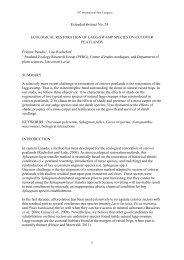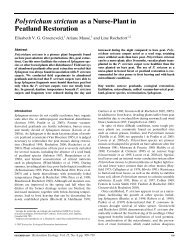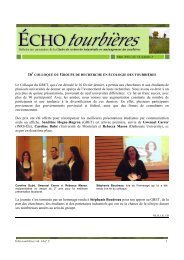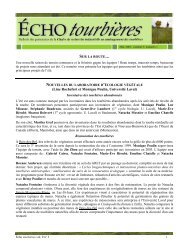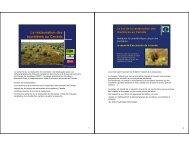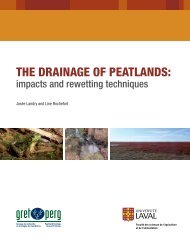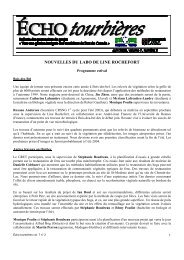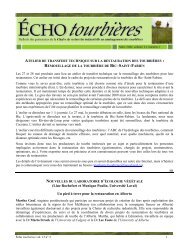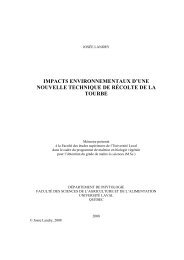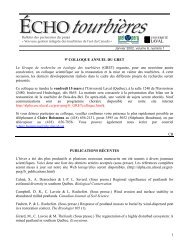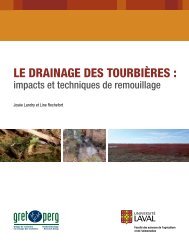wise use of mires and peatlands - Peatland Ecology Research Group
wise use of mires and peatlands - Peatland Ecology Research Group
wise use of mires and peatlands - Peatland Ecology Research Group
You also want an ePaper? Increase the reach of your titles
YUMPU automatically turns print PDFs into web optimized ePapers that Google loves.
VALUES AND CONFLICTS: WHERE DIFFERENT VALUES MEET111Environmental costs <strong>of</strong> peatl<strong>and</strong> drainageN emissions from drained fens to water in Sweden 120 15 – 1,736Greenho<strong>use</strong> gas emissions from drained fens in NE Germany 121 1.5 – 26Restoration costs 122general wetl<strong>and</strong> restoration 123 120 – 420replanting mangroves in Thail<strong>and</strong> 124 6restoring shrimp ponds to mangroves 125 83Table 4/4: Monetary values (in 1000 US$ km -2 yr -1 ) <strong>of</strong> some peatl<strong>and</strong> (<strong>and</strong> related wetl<strong>and</strong>)functions for the year 2000 91 .person’s role at a specific moment 133 . Evenwithin a single role a person’s order <strong>of</strong>preferences may rapidly change with theirstate <strong>of</strong> mind – for example, a preferencefor a type <strong>of</strong> l<strong>and</strong>scape.■ Non-egocentric anthropocentrism 134requires that the value <strong>of</strong> specific functionsfor future generations be taken intoaccount. Such determination might bepossible with respect to fundamental needswhich are not expected to change 135 , butnot with respect to the more subtle wants<strong>and</strong> preferences 136 . The same accounts forlong-term effects, such as climate change,that will affect future generations more thanthe present generation <strong>and</strong> shouldtherefore - to get a complete view - also beevaluated by those future generations,which is impossible.“Normal” problems <strong>of</strong> the future are likelyto be soluble through investment. With aneconomic growth rate <strong>of</strong> some 1.6% per year,a technical solution that would cost 100million in 100 years requires an investment <strong>of</strong>20 million now, if the rate <strong>of</strong> technologicalchange remains constant. If technologicalprogress were to increase by a similar rate,the cost <strong>of</strong> a similar future solution would beonly 4 million now. 139 “Normal problems” arethose that can be solved by progress. Thequestion is how to measure this progress, i.e.which discount rate 140 should be applied, asnothing influences long-term assessments<strong>and</strong> cost-benefit analyses more than thediscount rate. 141 Discounting can make thenon-sustainable <strong>use</strong> preferable to thesustainable <strong>use</strong>. If the rate <strong>of</strong> interest onmonetary capital is higher than the rate <strong>of</strong>reproduction <strong>of</strong> a renewable resource, thiscould push the <strong>use</strong> <strong>of</strong> that resource to thepoint <strong>of</strong> extinction 142 .It is unlikely that the current rate <strong>of</strong>exponential economic growth can continueindefinitely 143 . In the case that contemporaryeconomic growth is replaced by biophysicalequilibrium, the market rate <strong>of</strong> interest willgive fundamentally misleading signals to anycurrent generation. 144 The rate <strong>of</strong> technicalprogress, if it can be measured in an unbiasedway, would provide a more appropriatediscount rate.Future generations will probably be better <strong>of</strong>fonly in some respects, so we are permitted todiscount with regard to these respects alone.Complex patterns <strong>of</strong> increasing scarcity <strong>and</strong>growing abundance will be more likely to occurthan an overwhelming pattern <strong>of</strong> diminishingscarcity in all respects 145 . It is thereforemisleading to treat goods whose scarcity willprobably increase irreversibly in the same wayas goods whose scarcity will probablydiminish 146 .



